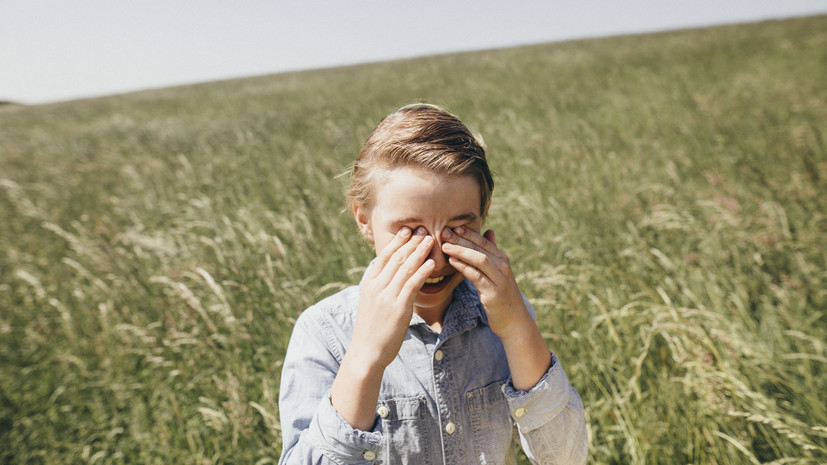According to experts, seasonal allergies are a reaction of the immune system to the flowering of plants. In medicine, this condition is called pollinosis or seasonal allergic rhinoconjunctivitis, and in the common people - hay fever. Clinically, the disease is expressed in allergic inflammation of the mucous membranes of the respiratory tract, eyes, skin. A little less often, other body systems are involved in the process.
According to data published on the website of the Russian Association of Allergologists and Clinical Immunologists, the prevalence of allergic rhinitis in different countries of the world is 4-32%, and in Russia - 10-24%.
At the same time, experts note that patients rarely go to doctors in the early stages of the disease, and also late undergo the diagnosis necessary in such situations. At the same time, according to the data given in the publication, in most cases the disease begins to manifest itself in preschool or adolescence.
People prone to seasonal allergies most often experience discomfort several times a year: in March-April, May-June and mid-July, as well as in August-September. During these periods, trees, cereals and grasses in the meadows, wormwood, ragweed, quinoa, sunflower, corn and other plants are actively blooming.
Speaking about the very beginning of the allergy season, immunologist-allergist Vladimir Bolibok told RT that with the onset of climatic spring, alder begins to bloom, followed by hazel (hazel), then birch.
"After the oak begins to bloom, in the southern regions - hornbeam, pine can also be an allergen. When the poplar and oak blossom, the flowering of meadow grasses begins. Most often, allergies are caused by timofeevka, bonfire, ryegrass, bluegrass. Quinoa, wormwood and ragweed are the last wave of flowering grasses," the expert added.
Sneezing, runny nose, inflammation - frequent signs of allergies
The most characteristic symptom of an allergy to pollen of plants is sneezing, said Vladimir Bolibok. In addition, the patient may experience nasal congestion, extremely rarely this is accompanied by a temperature if there is a concomitant infection in the nose or in the maxillary sinuses.
"There may also be conjunctivitis - inflammation of the mucous membrane of the eyes, they begin to itch, turn red, photophobia occurs. If the symptoms are more severe, then asthma attacks occur. Symptoms are highly dependent on the amount of pollen in the air. Sometimes there is so much of it that allergy sufferers even have inflammation of the skin, for example, in the forehead, chin, as well as in areas where clothes are adjacent to the body: the area under the collar, cuffs, "the doctor explained.
The most dangerous symptom of allergies is a lack of air, when a person begins to suffocate. In such cases, it is urgent to consult a specialist, Bolibok emphasized.
"Consult a doctor", or what to do when the first signs of allergies appear
Doctor-allergist-immunologist of "INVITRO-Voronezh" Lyudmila Makhovaya in an interview with RT told what measures should be taken so that allergies do not change the quality of life of patients for the worse.
First, when unpleasant symptoms appear, it is necessary to contact an allergist-immunologist to determine individual hypersensitivity. Based on complaints and anamnesis, a qualified specialist will help from the list of numerous allergens to determine those that cause unpleasant symptoms in a particular person (allergens of trees, cereals or weeds), will offer to undergo an examination and clarify the diagnosis.
Secondly, many types of pollinosis can be treated etiologically, that is, to eliminate the cause of the disease. Allergen-specific immunotherapy will help in this - treatment with increasing concentrations and doses of the allergen administered subcutaneously or sublingually. It is necessary to start therapy under the supervision of the attending physician on time, or rather four months before the expected flowering season of allergy-causing plants.
According to Makhova, there are cases when it is not possible to choose an etiological treatment. In such situations, the symptoms of allergies will help alleviate the symptomatic drugs prescribed by the doctor.
- Linden flowers
- Gettyimages.ru
- © Alin Covasa Photography / 500px
In turn, Vladimir Bolibok recommended that allergy sufferers avoid contact with pollen. If we talk about everyday life, you can put special filtering systems on the windows.
"In addition, it is necessary to do wet cleaning daily. It is desirable that this is done not by the allergic person himself, but by someone to help him. If you clean yourself, be sure to wear gloves, a mask, protect your hair, "the specialist said.
In addition, the doctor advised to change clothes more often, take a shower, use personal protective equipment, for example, a regular medical mask, glasses.
Another important way to combat the manifestations of allergies is to follow a diet prescribed by a doctor. As noted in a conversation with RT allergist-immunologist Ph.D. Alexey Popovich, this is due to the fact that a number of products have cross-allergens with seasonal pollen.
At the same time, he recommended studying specialized sites that have information about the content of pollen in the air. Those who play sports on the street, the specialist advised to use special masks or filters.
"Now they recommend filters for the nose. These are such small hemispheres, they are sold in pharmacies, on the Internet. They are placed in the nose, they are quite comfortable, you can walk with them all day, they retain pollen so that it does not enter the respiratory tract, "Popovich explained.

